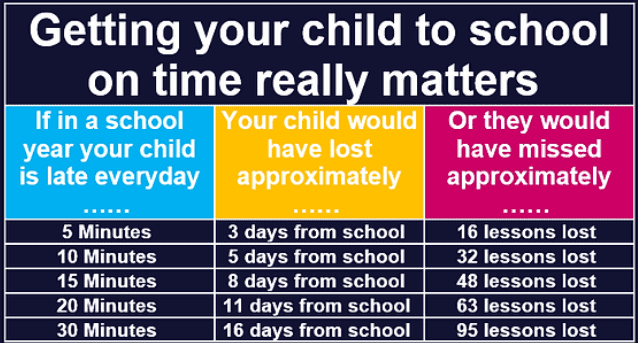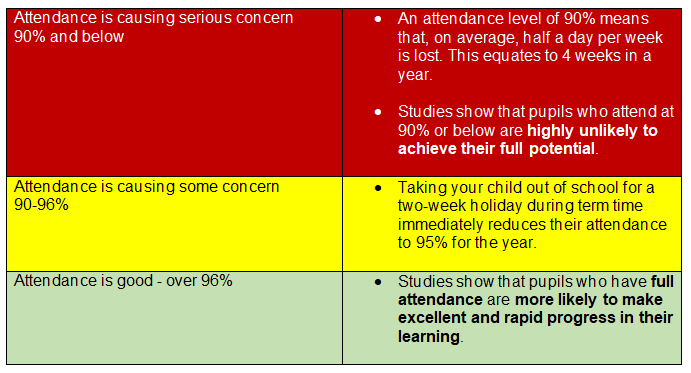
Attend to Achieve Awards
To reward children who attend school regularly, we have weekly, half-termly, termly and annual awards.
Weekly Class Competition: A weekly celebration assembly of class attendance – a certificate and trophy will be given to the class with the highest attendance.
Half-Termly Award: A £25 class reward will be given to the class with the most certificates over a half term to spend in school.
Termly Award: 100% and improvement attendance certificates will be given to children in celebration assemblies.
A termly family prize draw for 100% attendance will take place – vouchers.
Working together to improve school attendance
Being in school and having the best attendance possible underpins all the many benefits of school for your child. This is important not just for your child’s learning, but also for their overall wellbeing, wider development and their mental health.
Parents’ responsibilities
As a parent, you are legally responsible for making sure your child gets a suitable fulltime education, usually from the age of 5 to 16. For most parents, this will mean making sure your child is in school every day except when:
- Your child is too ill to go to school,
- You have permission for a leave of absence from school for them not to attend. You should only ask for this in exceptional circumstances.
- Your religious body has a day especially for religious observance.
Whilst some absence is unavoidable, it is important that your child is in school every day they can be for their learning, wellbeing and development.
If my child needs to be absent from school, what do I need to do?
You should contact school as early as possible on the first day of absence to explain why. If you do not, we will contact you on the first morning of their absence to find out why your child is not in school.
All parents can request a ‘leave of absence’ for their child which gives them permission to be absent from school. Our school has the final say over whether to approve the request and for how long your child can be absent.


Frequently asked Questions
My child has a short-term illness. Do they have to go to school, and will I be penalised if they don’t?
As a parent, it can be difficult to know when to send your child into school if they are feeling unwell or mildly anxious, but finding solutions is a team effort between schools, parents and children, and there is support and information available to help you make the best decision for your child.
It’s usually safe for parents and carers to send their children to school with mild illnesses, like a minor cough, runny nose or sore throat. However, children should stay at home if they have a high temperature of 38C or above. The NHS has published guidance to help parents and carers decide whether their child is well enough to attend school, including information on a range of common childhood illnesses and conditions, such as coughs, colds, chickenpox, measles and headlice.
You should let us know as soon as possible on the first day of absence so we can record such absences as authorised. If the absence due to illness is ongoing or frequent you should speak to child’s teacher to see what support can be put in place.
Do I need to provide medical evidence to support my child’s illness related absence?
If your child is too ill to attend school, we will record these absences as authorised. In the majority of cases medical evidence is not needed, but schools may ask you for evidence where:
- Your child is regularly absent because of illness, to assess how they can help your child by putting the right reasonable adjustments in place.
- In a small number of cases where they have reason to believe your child was not too ill to attend and a conversation cannot resolve the issue.
If you are asked to provide evidence this does not need to be a letter from your doctor or consultant, and doctors will not usually provide such letters. It can, instead, be appointment cards, prescriptions, or notes of previous consultations (including from the NHS App).
What should I do if my child needs a dental or medical appointment in school time?
To avoid disruption to your child’s attendance, medical and dental appointments should not be booked during the school day whenever reasonably possible. When they are, you should ask our school in advance for a leave of absence and collect them as close to the time of the appointment as possible and return them to school for the rest of the school day afterwards.
Accessing support to help my child attend school
My child is struggling to attend because of an issue in school. Who can help us?
The first step is to talk to us about why your child is missing school so we can discuss what support we can give. You should still do everything you can to help your child attend as much as possible whilst waiting for help and support to be put into place. If your child is struggling to attend because of something that is happening at school, we will work very closely with you to resolve this. This will include a commitment to support you and your child by working together or help you to access support services in exchange for an agreement from you to take part in the support offered. We will also arrange times for you to come together to review these actions and your child’s progress. Depending on the reasons for your child’s absence, this may take the form of an action plan, an early help plan, or a parenting contract.
What does it mean if a child is persistently or severely absent?
Children who are registered at school but regularly fail to turn up are officially referred to as being ‘persistently’ or ‘severely’ absent. The school day is split into two sessions – one session counts as a morning or afternoon spent in school. Pupils who have missed more than 10 per cent of school sessions are considered persistently absent, while children who have missed more than 50 per cent of school sessions are referred to as severely absent. Again, we will work very closely with you as a family to ensure your child attends school to enable them the very best opportunity to reach their full potential.
My child is struggling to attend because of an issue at home or getting to school. Who can help us?
Again, talking to us should be your first step. In these discussions we may be able to work alongside the school nurse or local housing or transport team to support you. If there are lots of reasons for your child’s absence, local services will work together to support you and your child.
My child has a long-term illness, special educational needs or a disability that is impacting their attendance. What help is available?
If your child is regularly absent from school because of illness (regardless of whether it is mental or physical) or special educational needs or a disability, they have the same right to a suitable full-time education as any other child. You should work with us to discuss the reasons and make sure the right support is in place.
Where can I get help if my child is too anxious to go to school?
Attending school usually helps to protect your child’s mental health, for a range of reasons including giving them a chance to be with friends and to benefit from learning. However, some children can be anxious or worried about going to school, particularly around the start of the new year or joining a new school or class. This is a normal emotion, and not necessarily indicative of an underlying mental health condition. If their anxiety continues and becomes an attendance issue we will work together with your child about why they are anxious and what can be done. You can find some useful advice at Young Minds, to help work through likely reasons together with your child, what to do and how to make sure that you get the right support if there are more serious issues.
What about children with SEND?
Of course, some children face greater barriers to attendance, such as pupils with long term medical conditions or special educational needs and disabilities. For children who face complex barriers to attendance, we will have sensitive conversations with children and families and work with them to put support in place. Support may include reasonable adjustments for pupils with disabilities or help for pupils where mental health issues are affecting their attendance.
